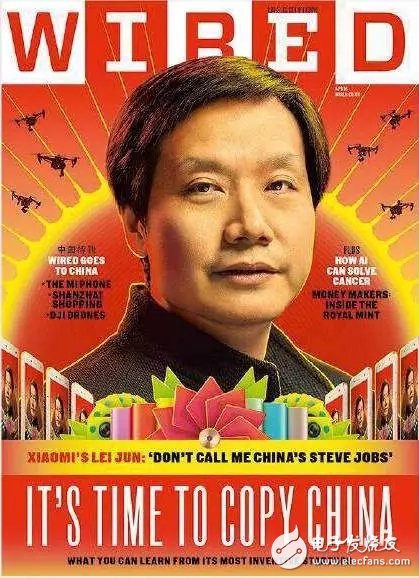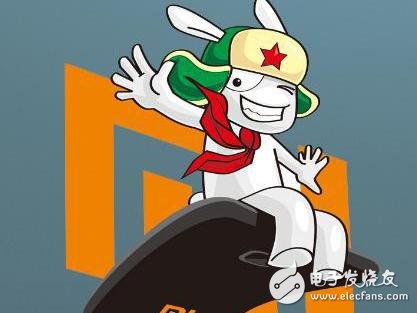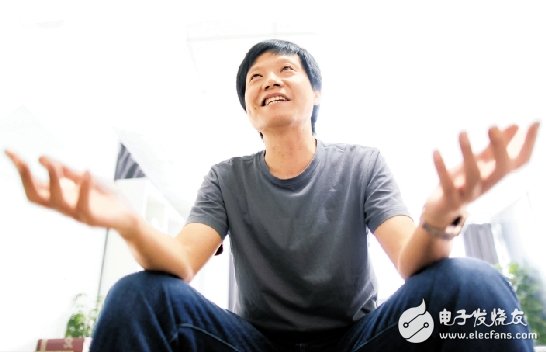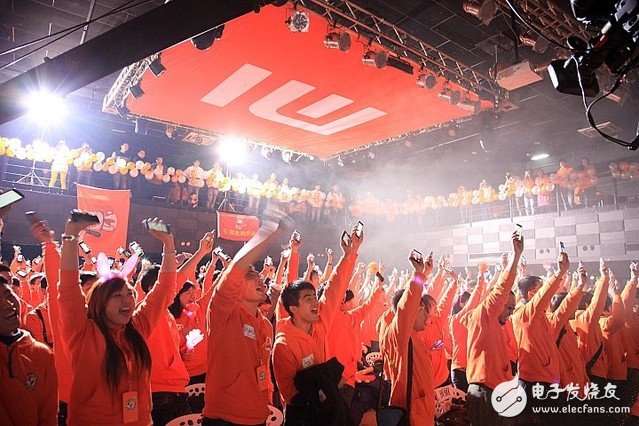How does Lei Jun build a $45 billion worth of the world's most valuable technology startups has become a deliberate, not a simple mobile phone business, but a new Internet ecosystem: let users become fans, Let everyone participate in the design and promote the product together; spread the market demand risk to small hardware startups through strategic investment; reduce costs by reducing inventory and optimizing supply chain; sell high quality products at the lowest price At the same time, innovatively occupy the top of the market through services, content and accessories.

On the woolen road in Haidian District outside Beijing's North Fifth Ring Road, there is a very inconspicuous display shop. This shop is decorated like an Apple store, which is Xiaomi's flagship store. Here, you can experience products such as Xiaomi's tablet and mobile phone in the same way as the Apple store. The staff wearing the millet uniform will help you experience the synchronization function of Xiaomi Smart TV or Xiaomi Cloud Storage.
Millet tablet with pink/green/yellow/blue/white options, similar to Apple 5C's pink/green/yellow/blue/white color, while the tablet has a 7.9-inch screen with 2048*1536 resolution The 326-pixel PPI is similar to the iPadMini4.
The simple store design is undoubtedly the style of the California company. The clean wall shows the phone case and charger. Only the huge "Mi" logo on the wall indicates that this is a Chinese technology company - Xiaomi, his CEO The founder is Lei Jun, who reported that he was greatly influenced by Jobs during his college years. Indeed, when Lei Jun released the Xiaomi 4 mobile phone in July 2014, he announced that Xiaomi had already contacted the iPhone manufacturer...
However, this story is not the story of Chinese invaders cloning Apple's patents and ideas.
How does Lei Jun build a $45 billion worth of the world's most valuable technology startups has become a deliberate, not a simple mobile phone business, but a new Internet ecosystem: let users become fans, Let everyone participate in the design and promote the product together; spread the market demand risk to small hardware startups through strategic investment; reduce costs by reducing inventory and optimizing supply chain; sell high quality products at the lowest price At the same time, innovatively occupy the top of the market through services, content and accessories. In the past five years, Xiaomi has already received 160 million mobile phone users and entered markets such as Indonesia and India, challenging the West’s long-standing impression of Chinese technology.
It is time for the cottage China! !
“We are a very different Chinese company: we don’t hesitate to guarantee every piece of millet’s products at the same price,†Lei Jun said. “I believe that Xiaomi promotes and improves the quality standards of Chinese manufacturing and will ultimately help China to get rid of low quality and The image of the cottage. In the past few years, Xiaomi’s mission has gradually escalated to change the world’s perception of Chinese products.
Hugo Barra, a former Google product executive and vice president of Xiaomi, said, "We don't care much about how many mobile phones we sell. We think we are smart phone companies. In fact, we are an Internet company."
Xiaomi insists that he is an Internet company, not just a mobile phone company - even though their mobile phones are sold very successfully. Xiaomi's twitter recorded the company's growth record: In August 2011, Xiaomi sold 100,000 mobile phones in 3 hours; on April 24, 2012, Xiaomi sold 150,000 in 15 minutes. Mobile phone; on September 20, 2012, Xiaomi sold 300,000 mobile phones in just 4 minutes. In 2012, Xiaomi sold a total of 7.2 million mobile phones; in 2013, sales of Xiaomi mobile phones sold 18.7 million; in 2014, Xiaomi sold 61 million, becoming the largest mobile phone company in China. In 2015, they sold more than 70 million units.
Under the leadership of Hugo Barra, Xiaomi has also grown rapidly in the international market, especially in emerging markets with large populations. In April 2014, Xiaomi bought Mi.com's domain name with a record of US$3.6 million in China's domestic record, and took the first step toward international, because “Mi†is more easily pronounced to foreigners than “XiaoMiâ€.
Lei Jun does not want the readers of Wired magazine to use Xiaomi as a company that produces mobile phones. Instead, they should "use Xiaomi as a company that can bring innovation to everyone. We focus on producing high quality products and can help users create one. Connectable products. It's not just mobile phones, tablets, TVs, routers, but also many startups in the ecosystem we talk about. They make a variety of products sold on Mi.com, including Mobile power, wearables, air purifiers and drinking water purifiers. These products together create a way of life."
He also wants to break the rumors of Chinese companies copying the West: "China has many innovations and ideas that the West has not kept up with." He said: "Look at WeChat, people use it as communication software, but it has evolved into A platform that combines games, payments, and multiple web services. Xiaomi is a smart phone company, but we are also an e-commerce company - Xiaomi.com is China's third-largest e-commerce website and game publishing Internet service company. We also invest in startups and help them sell their products on Mi.com."
Lei Jun said, "Our motto: less is more. Focus on a small number of products, we can become the best in the industry. But less is more, it also means that you will need other companies to help you do more is Things, that's why we invest in other companies and create an ecosystem to produce more products."
A dog adopted in a nearby neighborhood excitedly showed to visitors to the millet headquarters in Maofang Road, Beijing. The walls of the company corridor were covered with French impressionist motifs; Xiaomi’s rice rabbit mascot gaze outward from the office shelf. The desk was still busy at 8 o'clock in the evening: Xiaomi was a "996" company - the staff worked from 9 am to 9 pm, 6 days a week. On the window displayed by the company, there are gifts from rice noodles: Lei Jun and Hugo Barra's character models, brand-name shoes, mobile phone sets made of real edible millet, etc. - In 1946, Chairman Mao gave a speech. It is said that "Millet + Rifle" can also defeat enemies with better equipment. Lei Jun said that "Mi" represents the mobile network (MobileInternet) and the impossible task (Missionimpossible).

“10 years ago, I came to the conclusion that mobile networks will be the future trend,†he said. “I love smartphones very much. When the first Apple and Android phones came out, I decided to make an Android phone.â€
He started with an operating system called "MIUI", which is different from competitors in all other markets: users can provide suggestions for improvement and can be implemented in the updated version every week.
Lei Jun, 46, was born in Xiantao, Hubei Province, and graduated from Wuhan University with a major in computer science. In his student days, he read "The Fire of Silicon Valley" and called it "Change Life" book, and was fascinated by Jobs' decision to "build a world-class company." In 1992, after a year of graduation, he joined Jinshan Company and later rose to the position of chairman and CEO. He has been in Jinshan until the company was listed in Hong Kong in 2007. At the same time, he also founded the online bookstore Joyo.com (Joyo.com), which was acquired by Amazon for $75 million in 2004. After leaving Jinshan, he became one of the main angel investors in China.
"I have never heard of him before I saw Lei Jun," recalls Liu De, director of Xiaomi's ecological chain products. At the time, he was 37 years old, still head of the Department of Industrial Design at Beijing University of Science and Technology, his wife and Xiaomi's other The wife of a co-founder, Hong Feng, is a university roommate. "The co-founders of Xiaomi were strangers to each other at first. Everyone came from Google, Motorola, Jinshan and other companies. When Lei Jun first saw me, he talked to me about the future of smart phones and asked if I wanted to He did it together. I rejected him at that time, and then I spent a month to consider this huge business opportunity."
The 42-year-old Liu De is wearing a black T-shirt and jeans, sitting in an office with a millet air purifier, a 60-inch millet TV, a millet smart scale and a Yeelight smart light. The 70-person department of Liu De is responsible for the sale of various accessories of Xiaomi on Mi.com and the home of a total of 22 Xiaomi homes already established in mainland China, Hong Kong and Taiwan, such as mobile-controlled Yi sports camera (Amazon). Price 53 pounds), Xiaomi smart bracelet (1 million sold in a month, priced at 79 yuan), 10400 mAh millet mobile power (sales over 10 million, priced at 69 yuan), 60-inch millet TV ( 4,999 RMB), even the rice rabbit doll (2 million sold in 2014). At present, Xiaomi only makes smart phones, tablets, TVs and TV set-top boxes and routers. Other products are produced by Xiaomi's independent company with investment of 100,000 US dollars to 500,000 US dollars, such as smart blood pressure meter (produced by California iHealthLabs) and Yunmi. Technology water purifiers and so on.
“We sell 600 products,†said Liu De. “If we do this ourselves, our company needs 20,000 employees, but we only have 8,000 employees. We have seen 600 startups in the past two years and selected 54 of them. Investment. We help them define their products and provide them with our sales channels, supply chain, branding and money management. Equivalent to them are our special forces, we are commanders."
“It’s 20 engineers, not the finance department to decide to invest. Often a meeting (just made a decision)â€, Liu De said: “We react much faster than traditional investors. For high-tech innovative industries, This is entirely a new model. Most VCs and investors have a lot of experience in investing in software and Internet companies, rather than investing in hardware – so many well-known VCs rely on Xiaomi’s judgment to vote.â€
But why not cultivate the ability to build products internally? “Small companies operate much faster than we do,†explains Liu De. “You have to stay sensitive and adapt to very fast changes. This is completely different from a different way of producing different products from different parts of the company. For example, AT&T used to Leading for 70 years, but finally surpassed by IBM; and 20 years later, IBM was overtaken by Microsoft. 10 years later, Google caught up with Microsoft, and in just 4 years, Facebook grew up."

“Traditional companies are like trees, they need time to grow up – but when they fall, they are especially fast. And Xiaomi is more like a bamboo forest: Have you seen bamboo forest dead? No, new bamboo is always growing fast. To replace the old bamboo. By investing in these companies, we are creating our own fresh bamboo, and we are building an ecological circle like a bamboo forest."
“We don’t consider the company’s valuation – just see if they have the best products and teams. These 20 engineers will participate in their board, but never vote against it. We respect the founders and their dreams.†These ventures The company has access to 160 million consumers: Within a year, Zi Mi, a mobile power startup, has become the world's largest mobile power company, said Liu De, "Millet bracelet manufacturer - Huami, at 6 Ten million bracelets were sold within a month."
“The Internet of Things is more important than smartphones or mobile internet,†said Liu De. “Wearables, watches, scales, and home devices will all be connected. Your phone is a connector. We have to seize this opportunity. This ecosystem It is our bet on the future. Within ten years, people will see that Xiaomi will change the entire Chinese market."
Three days before the interview, Xiaomi released NinebotMini, a balance car that can be up to 16km per hour, produced by a company invested by Xiaomi. Ninebot founder and CEO Gao Lufeng explained, “Millet is more engaged than typical investors – they give feedback, help redesign, introduce us to suppliers, provide sales channels... which means 5 times sales Lei Jun gave feedback on the appearance of this product, he proposed the shape of the handle with the height of the knee."
Xiaomi team and Sineway acquired in 2015 with Ninebot only in 5 years. “Segway does not intend to continue to adhere to the early forms,†Gao Lufeng said. “People will see our next product, not only very cool, but also very sincere, and we are currently focusing on unicycle balancing and service robots. "
Gao Lufeng said that the problem in China is that once the market likes you, you see the demand. “There is a saying in China that the hardware is slow and slow. It takes time to build it carefully. When it is presented in the market, you will see the demand. With Xiaomi, the number of people scheduled exceeds our expectations, so Our challenge is to ensure that consumers receive their products in a timely manner."
Hugo. Barra said, "The only product we really care about today is that all products are sold on our own e-commerce platform. Our mobile phone will become our traffic platform. When we have more and more users, we can Launching the game business, including the content business of movies, music and news, can also become a virtual operator - currently there are only 10 employees in this business. We can establish financial business - Xiaomi Finance. These users are from our traffic platform. Everyone else thinks we are a smartphone company. In fact, we are Internet companies."
Barra said that this is why the Xiaomi ecology that Liu De is responsible for is a key innovation in the field of smart phones. "From the perspective of Internet thinking, just a mobile phone that is better than the opponent is not enough," he said. "We need more and more dazzling products, then people will always come back to our website. This ecology is our acquisition and retention. An important element of the user. This is a virtuous circle: when you buy these smart devices, with smart LED lights, water purifiers, you will want the next one."
“If you are a partner of a company and your income depends on your product, you will be more enthusiastic about working; if you are a partner of a large company, it is not important whether the product is really good. - Your stock options are still there. But if you are an entrepreneur, once your product fails, you are finished. So you have more motivation to create products that will surprise you. Our mobile power Company - Zimi Company, they manufactured and sold two million "millet" mobile power sources within one month. The second place in mobile power is pirated millet - others said they are stealing our designs! Our one is wearable The company, Huami, sold 1.5 million bracelets a month. All of this stems from our Internet thinking – getting users with products that surprise users and making them more loyal and trustworthy.
Barra said that some companies in the West also have similar Internet thinking ("the platform is monetized afterwards"): such as Uber, as well as his old loyalty to Google in 2013. However, there are some very unique situations in China. For example, Ma Yun (Alibaba), Ma Huateng (Tencent), Lei Jun, they have unlimited imagination - you can hardly believe how they have those ideas and quickly achieve success. With China's existing manufacturing capabilities, in the field of electronic products, this ecological environment can be realized in a few years. China will not only become a global leader in implementation and innovation.
“If you want to implement Internet thinking in products in the consumer field, there are two things that are most important, that is, focus and scale. In Xiaomi, we only make one model for any product, so our research and development costs for individual products are lower than others. Also because of the large scale, the production cost of individual products has been decreasing. In addition, we know our users very well. This is inextricably linked with our Xiaomi community. Many volunteers invested a lot of time and created We have a lot of the best content. You can't replace the effects of this community with any other marketing strategy in the world.
There are currently 58 million registered people in the Xiaomi community, and there are millions of daily “rice noodlesâ€. Li Ming, Xiaomi's No. 9 employee, led 20 employees to run the forum, manage fan issues and collect feedback. Xiaomi invited fans to attend various events, Xiaoguo, vice president of Xiaomi. Barra and more than a hundred fans danced on stage, or let fans get products earlier. Li Ming said, "They are not users, not consumers. They are friends in our hearts." At present, fans of the Xiaomi community have spontaneously performed 600-700 activities in 120 cities.

When Xiaomi commemorated the company's 5th anniversary in April last year, they held the "rice flour festival" event, and eventually they created a world record: within 24 hours, they sold 2.112 million mobile phones online.
“On the social platform, everyone can comment on new products, but you can't judge which is the user of Xiaomi mobile phone. Xiaomi community is a 'home' that allows users to feel a sense of belonging. Many merchants want to think Selling products, and we are thinking about interacting with users. When you have a community, you can easily build your own word of mouth."
"Connected" reporter pointed out that another Chinese mobile phone brand "One Plus" is also building its own community. Li Ming said, "They may refer to our book (participation) in some practices. China's mobile phone dealers I hope to copy the model of Xiaomi, but some aspects can not be solved by recruiting a few people. Among them, the culture advocated by Lei Jun is very important."
For Xiaomi’s “lightning out†is because of the limited production capacity of Xiaomi, Li Ming said, “We have never made 'hunger marketing’. The reason people have this impression is that as a small company, our production capacity is really limited. So fans can't buy mobile phones in the first place. When our company's scale is gradually increasing, we still can't fully meet the market demand." In a sales in the Indian market in October 2014, 100,000 mobile phones were in 4.2 seconds. Was robbed.
Last year, Huawei actively deployed in the domestic market, but Xiaomi has already set its sights on overseas. Since entering the Indian market in 2014, Xiaomi has entered the markets of Singapore, the Philippines and Malaysia. In the Middle East and North Africa market, Xiaomi mobile phones are also introduced through partners. However, the expansion of Xiaomi's market in Western countries has been hampered by patents, although Xiaomi said that it has applied for more than 6,000 patents since 2014.
Xiaomi also announced that it will invest $1 billion in TV content. In an interview with the Wall Street Journal in October last year, Lei Jun said that users of Xiaomi use their mobile phones 115 times a day, and the time spent on them is four and a half hours. It is conceivable that this is a platform.
Six months ago, Lei Jun made a speech on "What is the future of Xiaomi?" "One day, Xiaomi will become Sony in the 1970s, become Samsung in the 1980s and 1990s, and 10 years. Within this, China will lead the world in all fields."
At the same time, he is also determined to explain the argument that Xiaomi is a cottage apple. Xiao De's co-founder Liu De said in Xiaomi's official website in 2013, "Steve Jobs is a great person, he made a huge contribution, he changed the world, is a huge incentive for Xiaomi, but with Jobs as a The comparison is completely inappropriate."
"Connect" asked him to explain his personal relationship with Apple and Jobs. He said through translation: "I admire Jobs' achievements. But Xiaomi and Apple are different companies, we are very open, we emphasize our very The users, that is, the rice noodles, responded positively to their feedback and even had a party with them. We believe that everyone can have innovation, which is why we sell our products at a close cost."
Xiaomi Vice President Hugo Barra said, "In the next few years, China's role in the world will be better understood, and China's Internet thinking has already given the world a lesson.
Fiber Optic Cabinet,Fiber Cabinet,Fiber Distribution Cabinet,Outdoor Fiber Cabinet
Cixi Dani Plastic Products Co.,Ltd , https://www.danifiberoptic.com